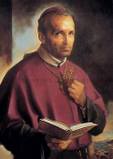Today marks the feast of St. Alphonsus Liguori (1696- 1787), founder of the Redemptorist order, patron saint of moral theologians,  bishop, and doctor of the Church (not bad for one lifetime!). Liguori lived an incredibly rich and difficult life, which you can read more about, but his life continues to provide insight into the nature and role of the moral theologian in the life of the Church. He came from a prominent family in Naples, Italy, and received an excellent education in law and civics, earning two doctorates from the University of Naples, and eventually starting a practice in law. Much to the chagrin of his father (and a few hopeful young women), he entered the diocesan seminary and was ordained a priest. He was later sent to investigate Sister Maria Celeste Crostarosa (1696-1755), who was claiming to receive visions from God instructing her to found a new religious order. Little did he know that she was not only having these visions in regard to a new order for women, but also that she believed Liguori was being called to found a new order himself. In the long run, her visions became part of the impetus for him to found the Redemptorist order.
bishop, and doctor of the Church (not bad for one lifetime!). Liguori lived an incredibly rich and difficult life, which you can read more about, but his life continues to provide insight into the nature and role of the moral theologian in the life of the Church. He came from a prominent family in Naples, Italy, and received an excellent education in law and civics, earning two doctorates from the University of Naples, and eventually starting a practice in law. Much to the chagrin of his father (and a few hopeful young women), he entered the diocesan seminary and was ordained a priest. He was later sent to investigate Sister Maria Celeste Crostarosa (1696-1755), who was claiming to receive visions from God instructing her to found a new religious order. Little did he know that she was not only having these visions in regard to a new order for women, but also that she believed Liguori was being called to found a new order himself. In the long run, her visions became part of the impetus for him to found the Redemptorist order.
Liguori wrote a massive work titled “Moral Theology,” that was highly influential upon the subsequent development of moral theology, as well as a pastoral “Guide for Confessors.” His Moral Theology sought to find a middle road between the very rigorous probabiliorism of the Dominicans and the more lax probabilism of the Jesuits. While the debate is a quite technical one about the relationship between law, authority, and conscience in moral contexts in which there is room for legitimate doubt about how to apply fundamental moral principles, his work is notable because of the way that it sought to find a middle ground between the two extremes of the probabiliorists and the probabilists. It is also notable because of his constant concern to consider the pastoral implications of how one engages in moral theology. He understood at a deep level that moral theology is only at the service of the Church and of the faithful if it somehow engages people at the level of their own lived experience.
Liguori thus remains an inspiring figure for those of us continuing in the tradition of moral theology today, especially for those of us concerned with striving to articulate a moral theology that avoids ideological extremes, and that connects with the lived experience of Christians engaged in the world and all of its daily struggles. Moreover, his model has inspired many of us involved in the New Wine, New Wineskins project – a gathering of young, Catholic moral theologians that occurs each year on the last weekend in July, the last weekend prior to Liguori’s feast. (I hope to post later about some of the highlights and lessons of this year’s conference.) As we continue to work to develop the tradition of Catholic moral theology, it is comforting to know of the guidance and prayers of saints like Liguori, who have endured suffering to bring the field forward as a thriving spiritual and intellectual enterprise in our day.
St. Alphonsus Liguiori
pray for us!




Trackbacks/Pingbacks